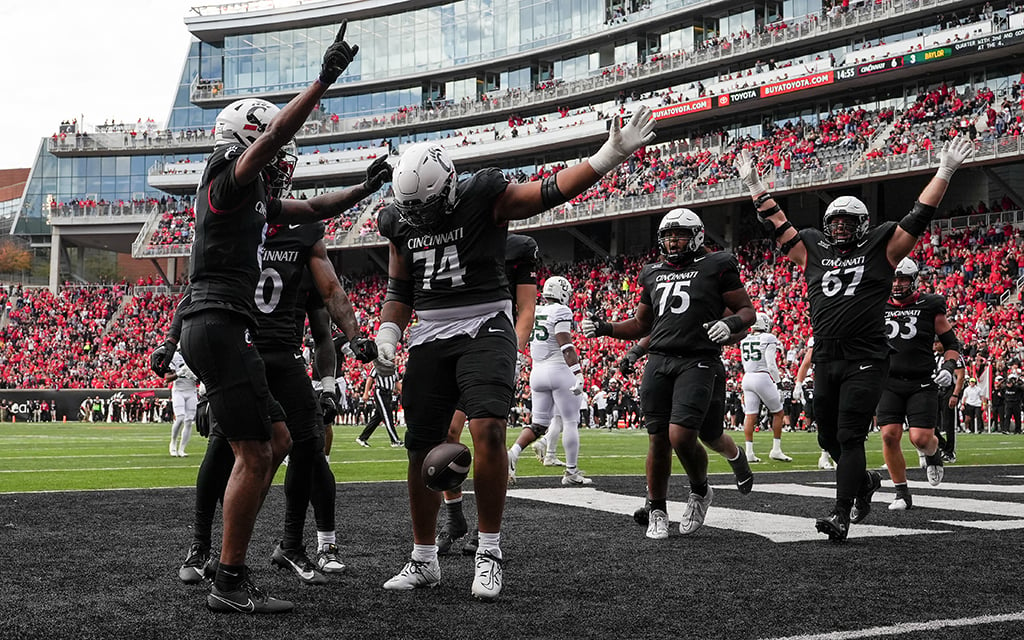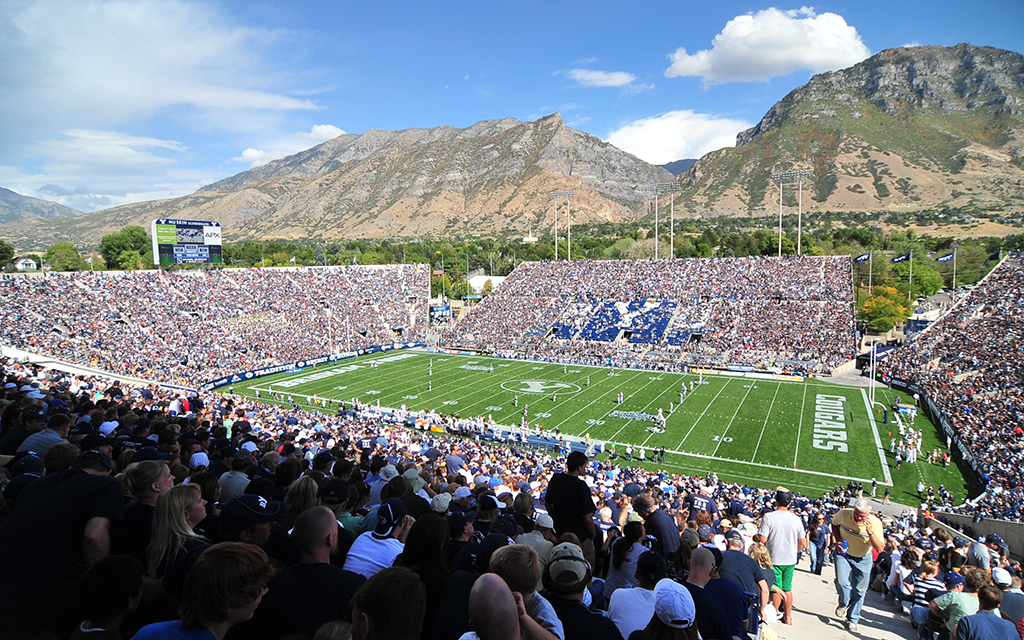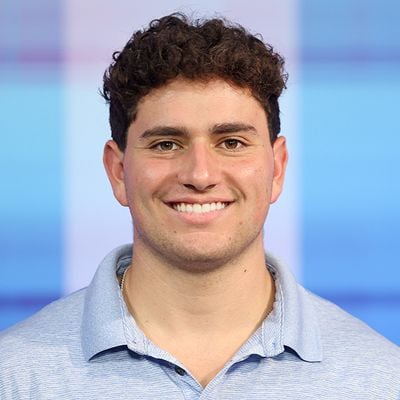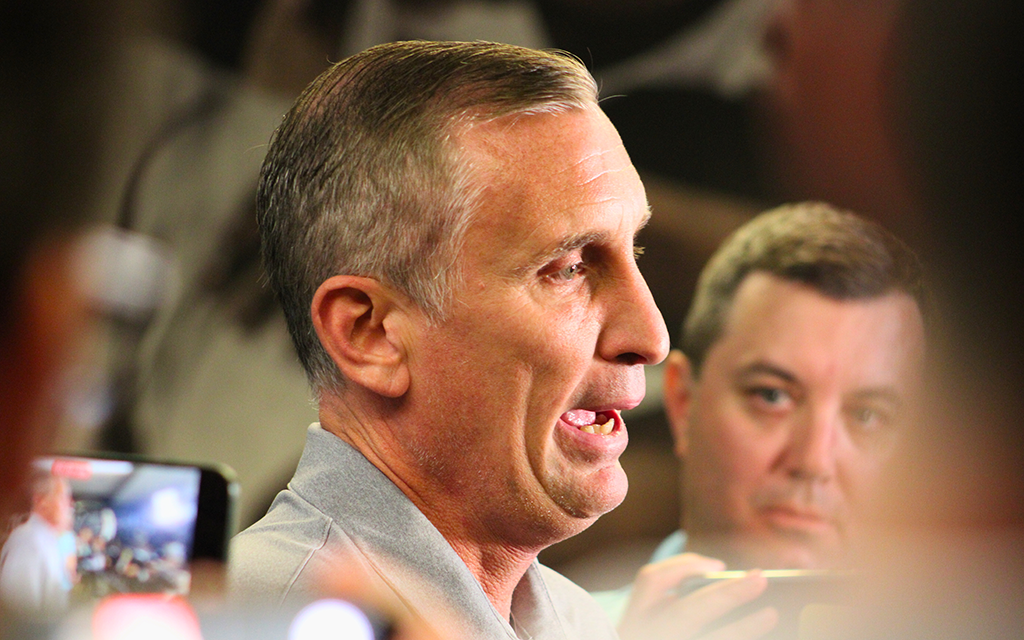
Transitioning from the Pac-12 to the Big 12, Arizona State men’s basketball team faces a pivotal 2023-24 season with coach Bobby Hurley expressing excitement and recognizing the challenges ahead. (Photo by Bennett Silvyn/Cronkite News)
TEMPE – The final first practice in the Pac-12 Conference for the Arizona State men’s basketball team this season prompted the inevitable question. How does coach Bobby Hurley feel about the last season of Pac-12 play? His response was simple:
“It gets you excited if you’re a competitor…,” Hurley said, “because I think, top to the bottom, (the Pac-12) could be as good as it’s been since COVID-19 stopped the season years back.”
That was the 2019-20 season, before the global pandemic shut down college basketball. Six of the conference’s 12 teams won 20 games or more and 10 were .500 or above. Oregon, Arizona, Washington and Colorado all ranked among the Associated Press Top 25 that season, but the Ducks, at No. 13, finished as the only conference team in the poll after the Pac-12 tournament was canceled.
Since the COVID-shortened year, other factors have caused a seismic shift in the college sports landscape – accelerated use of the NCAA transfer portal, conference realignment and name, image and likeness (NIL) legislation.
This swan song season for the conference has inspired reflection among those connected to the ASU program, from memories of games past to thoughts on life in the Big 12.
With ASU leaving the Pac-12 for the Big 12, the Sun Devils’ competition with powerhouse programs such as Kansas, Kansas State and Baylor won’t be limited to the court. Programs that can provide the best NIL opportunities are likely to have an edge, and the transfer portal will make retaining players paramount.
“I think some of the lower-tier teams have gotten considerably better, and you can change your fortunes quicker with the transfer portal now and NIL and things,” Hurley said. “So I think it’s going to be a very competitive year.”
Former Arizona State point guard Derek Glasser, who previously coached at Rice University before moving to the University of California Santa Barbara as an assistant coach, has watched Hurley lose key players to the portal in recent seasons, then restock ASU’s roster.
He believes it will only be more challenging in the Big 12, which is stacked with basketball powerhouse programs.
“He’s turned over his roster for the last few years with what is supposed to be high-level transfers, and that’s such a huge part of the game today,” Glasser said. “I think now in the Big 12, you’re recruiting against (Baylor’s) Scott Drew, (Kansas coach) Bill Self, some of the best recruiters and coaches in the country.
“There’s some heavy lifting ahead of us in the future in terms of competing with those types of programs, and the resources that they have and the brands that they are. I mean, you’re talking about having Baylor, Kansas and Arizona year in and year out, like three of the top 10 teams that there are.”
The Sun Devils got a taste of the Big 12 in last season’s NCAA tournament after delivering a 25-point beatdown to Nevada in a First Four game. They faced the Big 12’s TCU in the first round and fell, 72-70. There were seven Big 12 teams in the Big Dance, including a No. 1 seed in Kansas and a No. 2 seed in Texas.
“The Big 12 was outstanding last year in terms of the NCAA tournament and having a chance to play TCU in the first round,” Hurley said. “I started to see how big and athletic they were, and we kind of settled down in that game and we were fine.
“But it’s something in the back of our mind again that we’re excited about.”
Hurley’s teams have won 20 games or more four times during his tenure, including 23 last season. He has the third most 20-win seasons in school history behind only his predecessor Herb Sendek, who had five, and Ned Wulk, whose teams won 20 games or more six times in a career that spanned the school’s Western Athletic Conference and early Pac-10 Conference eras.
“You’re never satisfied, and that’s you’re never content with anything you’re doing,” Hurley said. “We had a great season last year, but how do we take further steps and get better?
“Going to the NCAA tournament is great, and it’s very difficult. And I think last year I might have talked about all the blue chip programs that weren’t even good enough to make it to the NCAA tournament. So, you have to take pride in that, but at the same time we want to try and compete for championships and win games in the NCAA tournament. On the practice court and then, and then certainly, you’ve got to put together a resume.
“I got my fingers crossed that the Pac-12 will be evaluated and rated as one of the better leagues so that we get more representation in the NCAA tournament and that we’re a respected league this year. All the programs have to do their part and hopefully win in some key non-conference games and then just get to work in the league to compete, put together the best season we can.
“If you do that then, when the ball goes up, wherever you’re going to be in the NCAA tournament, you have a great opportunity in front of you and you have to take advantage of it.”
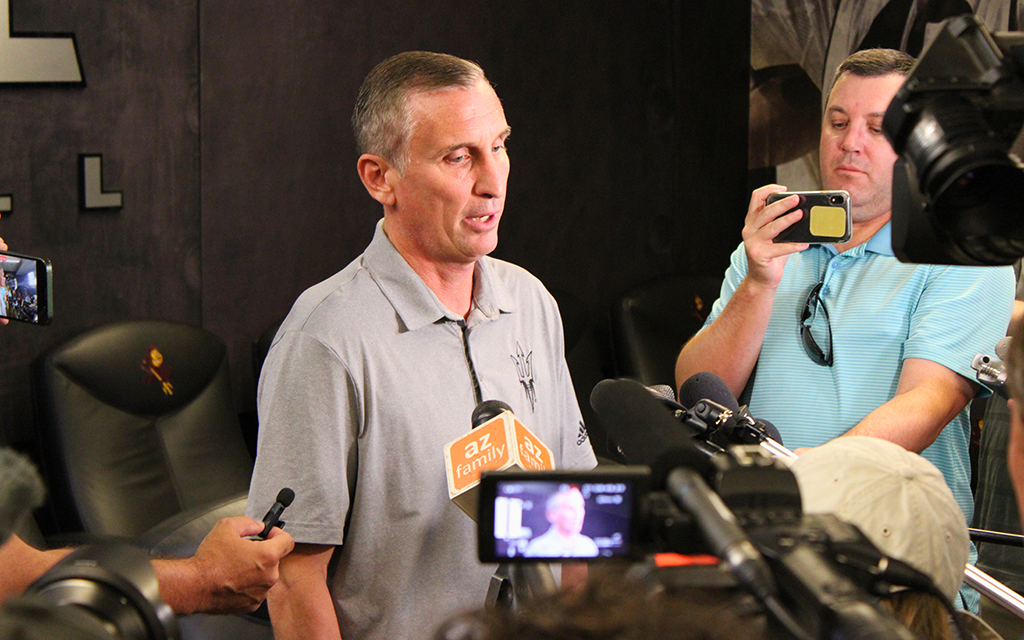
Bobby Hurley being questioned by media following practice. (Photo by Bennett Silvyn/Cronkite News)
The task for Hurley is likely to be even more difficult in the Big 12 than it has been in the Pac-12, and the Sun Devils have struggled throughout the years to maintain consistency in the basketball program.
The school hired Bill Frieder, who was at Michigan and considered one of the top coaches in the country, in 1989 in a controversial move, but also expected to put the Sun Devils on more equal footing with rival Arizona, where Lute Olson already had taken the Wildcats to the Final Four.
Frieder, too, was expecting to coach Michigan in the NCAA Tournament.
Instead, Bo Schembechler – who was the athletic director at Michigan at the time – announced he wanted a “Michigan man” to coach the Wolverines and named Steve Fisher interim coach. It was an interesting choice of words since Frieder graduated from Michigan and Schembechler did not.
Fisher and the Wolverines won the NCAA championship. Meanwhile, Frieder went on to coach the Sun Devils from 1989-1997. He brought a record of success to Tempe, as he had six straight seasons of winning 20 or more games during his time at Michigan. His last five Michigan teams all appeared in the NCAA tournament.
Frieder’s best team came during the junior season of Mario Bennett, a lanky 6-foot-9 forward. The Sun Devils beat Arizona twice that season and finished 24-9, securing a No. 5 seed in the NCAA tournament, where they advanced to the Sweet 16 before losing to No. 2 seed Kentucky.
“We had a team that had great shooters and had a great inside player in Mario,” Frieder said. “He had great depth at the forward position… that gave us a lot of flexibility when we played different types of opponents.”
However, the success wasn’t sustainable. Frieder resigned after the 1996-97 season amid accusations of point shaving orchestrated by a student bookmaker that involved players on the 1993-94 team.
It would be eight seasons after Frieder’s Sweet 16 team before the Sun Devils reached the NCAA tournament again in 2003 under coach Rob Evans.
The best players of the Evans era were guard Eddie House and big man Ike Diogu, two of the top-three scorers in the program’s history. Former ASU guard and Sun Devil radio broadcast analyst Kyle Dodd shared the backcourt with House, who once scored 61 points in a game.
“I remember reporters asking me, ‘What is it that you guys are doing off the court or what is it you guys are doing at practice, you and Eddie, because it seems like you guys are really jelling and you have good chemistry?’” Dodd said.
“I just kind of laughed because I just felt like saying, ‘I’m not doing anything. I just stay out of the way.’ I guess that’s chemistry, but he was just that good. Eddie made my job so easy because a lot of times I would just pass to an open hand or to a spot and the shot was up as soon as he got the ball. And the dude just didn’t miss.”
When Dodd wasn’t looking to get the ball to House, it was probably headed to Diogu, the team’s other NBA-level talent. House operated on the perimeter and was a knockdown shooter, while the Sun Devils mostly fed Diogu in the post.
“Having a talented guy like Ike, again, it made my job so easy because I really wasn’t worried about getting post feeds broken up or intercepted or whatever once the ball got anywhere near his hands,” Dodd said. “Ike was just a vacuum in there, and then the dude could flat-out score on the block. He could score by stretching the floor and he was just a super gifted player.”
Although Dodd didn’t make the NCAA tournament with House, he did reach the second round in the one year he played with Diogu.
“To be able to play with a guy like Ike at the end of my career after playing on the front side with Eddie, it was awesome,” Dodd said. “It was a really cool experience, and I’m sure both of those guys probably made me look a little better than I was.”
Sendek took over the program in 2006 and twice got the Sun Devils to the second round of the NCAA tournament. More importantly, he recruited All-American guard James Harden, along with another California native in Glasser.
Glasser scored a career-high 22 points and helped lead an upset over Temple University in the first round of the 2009 NCAA Tournament as the Sun Devils finished 25-10 and lost to Syracuse in the second round of the NCAAs.
Again, it appeared the ASU program might have momentum.
“It was an awesome year,” Glasser said. “We had a very good team, we had two NBA players (Harden and forward Jeff Ayers, who was drafted by the Sacramento Kings), and we had a lot of expectations, which was the first time in a while that an ASU team had.”
Now, the move to the Big 12 creates new challenges for Hurley, who had three NCAA Tournament teams during his tenure. But the Sun Devils aren’t alone.
One of the challenges is the difficulty for fans to travel to games. While football teams play on weekends and only play one game a week, basketball programs will play at least a couple of games each week.
While trips to Seattle and Pullman, Washington, were lengthy, the Sun Devils will be making trips to the Midwest and beyond. Central Florida, for instance, is located in the Orlando, Florida, area, more than 1,800 miles from Tempe.
And Glasser points out that traditional rivalries will be lost.
“It’s definitely a little weird,” Glasser said. “You’re going to lose some rivalries. I know when we played versus Washington and us and USC were major rivalries. Obviously, those teams probably may never play again outside of a tournament setting.
The hoops rivalry between Arizona and UCLA blossomed in the early years of Lute Olson’s reign in Tucson and continues. Coaches Tommy Lloyd of Arizona and Mick Cronin of UCLA have discussed keeping the rivalry going, the Associated Press reported, despite UCLA’s move to the Big Ten and Arizona’s switch to the Big 12.
Meanwhile, Arizona State just needs to figure out how to survive in the powerful Big 12. Frieder said that will start with recruiting.
“ASU has to do whatever it takes legally to get better talent and to be able to be successful in the Big 12,” Frieder said. “As far as I’m concerned, the Big 12 is probably the second-best league in the country. You’ve got the Big Ten and the Big 12.”
Both of those leagues have only gotten stronger with the ongoing realignment.
ASU, Arizona and Utah – another school with a strong basketball history – are joining the Big 12. Colorado already had announced its move to the Big 12 before the Arizona schools and Utah. Washington and Oregon, which have had strong Pac-12 basketball seasons in recent years, are joining the Big Ten along with USC and the storied UCLA basketball program.
California and Stanford are off to the ACC while Oregon State and Washington State are still trying to determine their future.
Hurley just wants to see all of the Pac-12 programs succeed in their new homes.
“I mean, I’m happy for them because we’ve had battles with all these programs and you want to see them land on solid ground in some way and make sure they’re in a good, competitive environment,” he said. “At the end of the day, there is a fraternity with the coaches and we compete against each other, but you don’t want to see any of those places be at a serious disadvantage or in a bad situation.”

